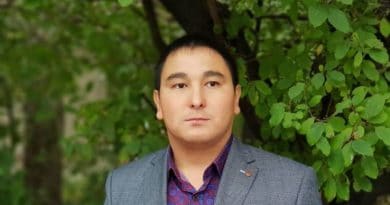Uzbekistan: women’s rights are violated in the colony
A transgender woman Nigina (in her passport – Mirsharif Zakirov), who is being bullied in colony-settlement No. 42, turned to the human rights activists of the Open Line initiative group for help. She is isolated from other prisoners, including from the inmates of the women’s barracks.
On January 5, human rights activists Tatyana Dovlatova and Klara Sakharova tried to sort out the situation, but the administration of the colony gave only a few minutes to communicate with Nigina.
She contacted them at the end of last year. She complained about food problems, as it wasn’t possible to cook her own food. For obvious reasons, she is not favored in the men’s barracks. And the head of the colony, Normukhamed Isakhanov, forbade female prisoners to communicate with the transgender.
In a conversation with an ACCA journalist, Stella Aganova, a former convict and now an activist of the Open Line, explained the encouragement of hostility towards Nigina by saying that “in the colony, complete power over women is given to the ‘authoritative’ prisoner Bahriniso Muminova. She dictates the rules: what and how to do, how to behave. She threatens them that she will put a violation on them and send them to prison with a different regime of detention.”
On December 31, 2021, Tatyana Dovlatova and Stella were able to get a meeting with Colonel Erkin Bobokulov, Deputy Head of the Department for the Execution of Punishments under the Ministry of Internal Affairs. After his call to the colony, the food issue was resolved.
“Now it’s important to provide her with medical assistance,” Dovlatova worries. Nigina, who was sentenced to three years in prison, was released with restriction of liberty at night. Even before the trial, she was beaten several times. While under house arrest, she was attacked during the day by an unknown person who hit her on the head with an iron. On November 18, during a walk, Nigina was attacked by three men in civilian clothes, who started beating and kicking her.
Everything happened in front of Stella Aganova. She saw how Nigina was intentionally beaten in the chest. At the same time, Nigina’s 10-year-old nephew was hit in the face. The attackers strongly pushed Aganova, she barely kept the 6-month-old baby in her arms. Then Nigina was taken to the Chilanzar Criminal Court in Tashkent, where the judge was already waiting for her. He awarded seven days of administrative arrest to her for resisting representatives of law enforcement agencies, but three days later the district police officer took Nigina out of the detention center and returned to the colony.
“The consequences of the attack turned into severe pain in her sternum, but the examination and subsequent medical assistance are not provided,” human rights activists say. There is a suspicion that silicone implants are damaged and can lead to a fatal outcome. On top of that, Nigina is deprived of legal support. According to her, she doesn’t understand why she is serving a sentence and is not familiar with the materials of the case.
Human rights activists also became aware of the fact of violations of the rights of 28-year-old prisoner Malika Sobirova, who has two children and is currently pregnant. The gynecologist of the polyclinic of Zangiata district, where the colony is located, refuses to register Sobirova. The doctor refers to the fact that previously pregnant prisoners didn’t come for examination. Stella Aganova refutes the words of the specialist and claims that the examination in the polyclinic of Zangiata is carried out on time and at the appointed time. Although at first Stella was also denied examination. However, when Aganova demanded a written refusal, they immediately issued a medical card for her.
The UN Human Rights Committee, in its Concluding Observations on Uzbekistan (May 2020), expressed concern over “continuing reports of discrimination, harassment and violence, including extortion, arbitrary arrest, torture and sexual abuse against lesbian, gay, bisexual and transgender people by government officials and private individuals, including in places of detention, as well as the obligatory disclosure of personal medical data.”




